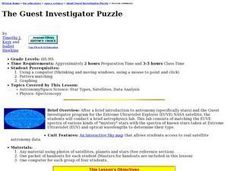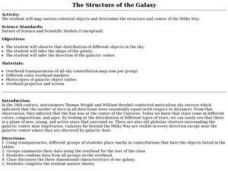Curated OER
Astrophysics Science Project Integrating Research and Education
Students determine if the particles are coming from above, below, or from one side or the other by using a circular array of scintillators
Curated OER
The Guest Investigator Puzzle
Students conduct a brief astrophysics lab matching the EUVE spectra of various kinds of "mystery" stars with the spectra of known stars taken at Extreme Ultraviolet and optical wavelengths to determine their type.
Curated OER
The Grating Spectrometer; Light and Wavelengths
Students create a paper model that demonstrates wave interference for 3 wavelength from 2 sources. In this light and wave lesson, students use a real spectrometer and observe and measure the wavelength of spectral lines. Students then,...
Curated OER
How Bright are the Stars?
Students observe the brightness of stars and are introduced to the concept of apparent brightness as a measure of how much light hits a detector of a surface area during a given time. In this star lesson, students make connections...
Curated OER
How Big Is That Star?
Aspiring astronomers study stars. They compare stars and explain the relationship between radius, mass, and diameter. By creating a star simulation, they discover how a binary star system's orbit can cause changes in the observed...
Curated OER
Supernova Chemistry
Using spectroscopes, high school astronomy, physics, or chemistry learners observe emission spectra from several different sources. This stellar NASA-produced lesson plan provides terrific teacher's notes and a student handout. Make sure...
Curated OER
Get the Picture!
Astronomers practice downloading data from a high-energy satellite and translate the data into colored or shaded pixels. As a hands-on activity, they use pennies to simulate high-energy satellite data and they convert their penny...
Curated OER
Time That Period
Physical science starters play with a pendulum in order to experience periodicity. Detailed procedures and a worksheet are included for day one. For day two, learners will use a graphing calculator to help them plot orbit data from a...
Curated OER
Modeling the Electromagnetic Spectrum
Examine the concept of an electromagnetic spectrum with your students, as they observe a demonstration of a model, construct and compare a different model of the spectrum commonly used in textbooks, and construct their own models of the...
Curated OER
What's the Frequency, Roy G. Biv?
Students examine the concept of frequency and wavelength. They analyze how frequency and wavelength relate to each other by conducting an experiment involving measuring and timing wavelengths by pulling adding machine tape through an...
Curated OER
Science in Focus: Force and Motion
Students explore force and motion through a series of experiments. In this physics lesson, students create and interpret speed graphs. They build an electromagnet and explain the factors affecting its strength.
Curated OER
A Classical & Relativistic Trip to a Black Hole
Learners calculate distance, velocity, acceleration and time on their fantasy trip to the black hold. They apply Newton's Laws of Motion and calculate circular motion. They discuss any questions that may arise.
Curated OER
Calculating the Moon's Width
Sixth graders measure the width of the Moon. In this Moon measurement lesson, 6th graders observe the Moon and complete a formula to calculate the width of the Moon.
Curated OER
The Structure of the Galaxy
Students infer the galaxy shape. In this structure of the galaxy instructional activity students observe the distribution of objects in the sky and answer questions.
Curated OER
Seeing Interference Fringes with a Telescope
Students construct an interferometer using a simple telescope. In this physics lesson, students explain how light waves create the fringe patterns. They observe patterns made by different objects in the sky and compare them.
Curated OER
Time That Period!
Students analyze data received from high-energy satellites of various binary star systems' orbital periods or stellar rotation periods.
Other popular searches
- Astrophysics and Astronomy
- Theoretical Astrophysics
- Astrophysics Time Lines
- Philosophy Astrophysics
- Astrophysics Labs
- Intro to Astrophysics
















